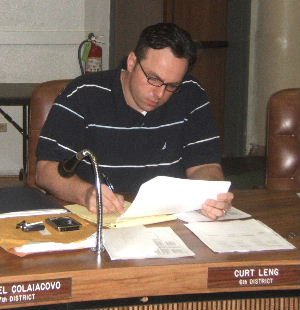| Hamden dumping dead dogs at landfill | |
| Police chief sets policy to save town from cremation fees | |
By Ann DeMatteo , Assistant Metro Editor | |
| HAMDEN — A new town practice of burying dead, unclaimed dogs at the already-capped Wintergreen Avenue dump is drawing outrage from some protesters. Late last year, the Police Department opted to begin the practice of dumping dogs at the landfill in an effort to save money. Previously, all dog remains were sent away for cremation, and the town would pay a fee from $10 to $40, depending on the dog’s weight, Police Chief Thomas J. Wydra said. Burying animals in the landfill is within the law, he said. A state Department of Agriculture spokeswoman agreed there was nothing wrong with burying the dogs at the landfill. “For decades, dead animals such as deer were routinely dumped at the landfill,” Wydra said. On Thursday, some dogs were found unburied at the dump. Wydra said that was unacceptable and that transfer station employees should be disciplined. But Councilman Curt Leng, D-6, said he is appalled. “I can’t stress enough how much I oppose this new policy,” Leng said in a memo sent Friday to Mayor Craig B. Henrici, demanding that all animals go back to being cremated. “Regardless of it’s legality, the humane thing to do with a deceased dog or cat found by a resident or town staff is to have it cremated, not dumped in a landfill, buried or not.” Quinnipiack Valley Health Director Leslie Balch on Friday differed with Wydra on the interpretation of the law. “I was not aware there was a change … I should have been made aware of the change or involved in the decision of the change,” Balch said. Wydra said the health director must be notified only if another method other than burial or incineration is used. “We either cremate dogs or bury them at the landfill. We’re complying and don’t need approval,” he said. Some unclaimed dogs are still euthanized and cremated when it’s determined that they are no longer adoptable, he said. The public health code states: “The carcass of any dead animal … shall be removed and disposed of within 24 hours after death by burial, incineration or other method approved by the local director of health.” The practice of dumping dead, unclaimed dogs at the landfill began several months ago, and was a decision Wydra said he made with Henrici. Balch said she would like to establish a policy for “appropriate and acceptable disposal of carcasses. I’m not sure it’s an issue from a health point of view, but it may be an issue from a respect point of view.” Wydra said the practice of disposing of dead, untagged dogs at the landfill was not unusual. Dead dogs or cats found on roads are placed in a freezer at the North Haven Animal Shelter because Hamden doesn’t have a facility for animals, Wydra said. The animals are held in the freezers “a reasonable amount of time” so that they can be claimed, before burial takes place, he said. But Officer Stephani Johnson of New Haven animal control, said most communities, including New Haven, cremate. Two well-known dog lovers in town, retired animal control officer Jean Murray and Dolores Giannini, were not pleased to learn the dogs’ bodies were being taken to the landfill. “You’re kidding. You’re kidding,” said Giannini, who is a driving force behind Hamden getting its own animal shelter. “I’m not a happy camper. Dead or alive, it’s somebody’s animal and they should be treated with respect.” “We’d take them to the vet, have them euthanized and then to the crematory,” Murray said. “It’s news to me. Dogs need to be taken care of like humans.” But Wydra said that people are “moralizing,” and that he’s following the law. “Incinerating a dead creature is disturbing to me. Burial is a much more appropriate means of disposing of a life. That’s how I feel,” Wydra said. “What’s the difference between Bambi and Spike?” Murray questioned whether it was a health hazard to have dog carcasses exposed at the landfill where wild animals such as coyotes can eat them. “We’re not aware of any requirements on the health end,” said Diana Lejardi, a spokeswoman for the state Department of Public Health, referring questions to the waste management bureau of the state Department of Environmental Protection. DEP spokesman Dennis Schain said the department has received “calls and complaints about the disposal of dogs at the landfill transfer station. We will talk to officials next week. We need more information on the means of disposal to make a determination.” Capt. John Karajanis of West Haven animal control said that cats and other small animals that are found dead are placed in trash bins in the back of the animal shelter on Collis Street. If a dog dies while in the city’s care, it is cremated. In Cheshire, a missing or deceased pet is hardly ever unclaimed, according to Animal Control Officer April Leiler. If an animal isn’t claimed after a few days, she makes an effort to find the owner. Otherwise, the animals are cremated and the town pays. But, she said she doesn’t have a problem with a town saving the cremation fee. “Do those people want to pay a $120 cremation fee for a dog not claimed? I get a $1,200 veterinarian budget. I’d much rather pay $125 on a live dog than a dead dog that nobody claims,” Leiler said. |
Saturday, February 23, 2008
New Haven Register Covering Dog Incident
Subscribe to:
Post Comments (Atom)

No comments:
Post a Comment